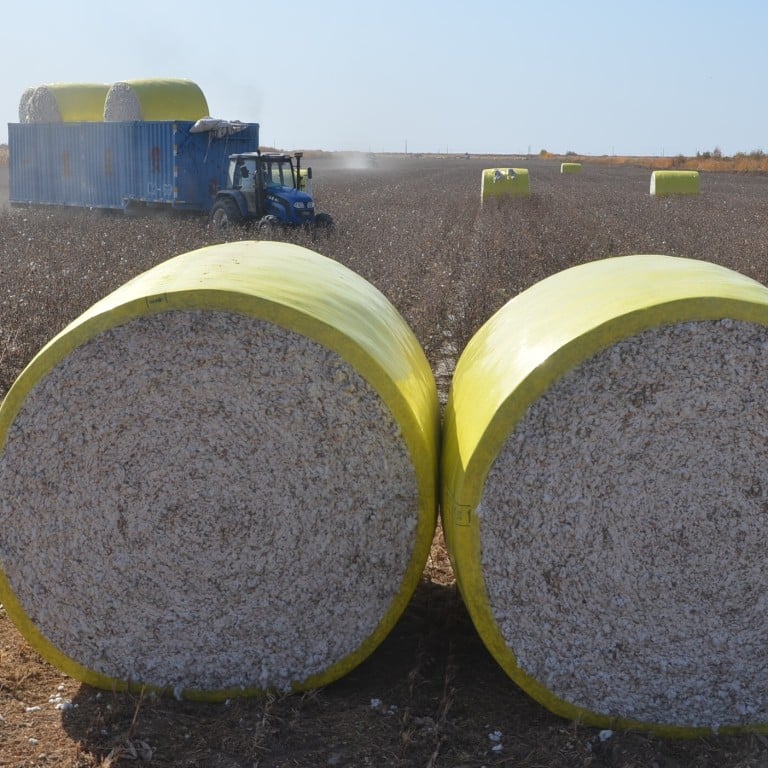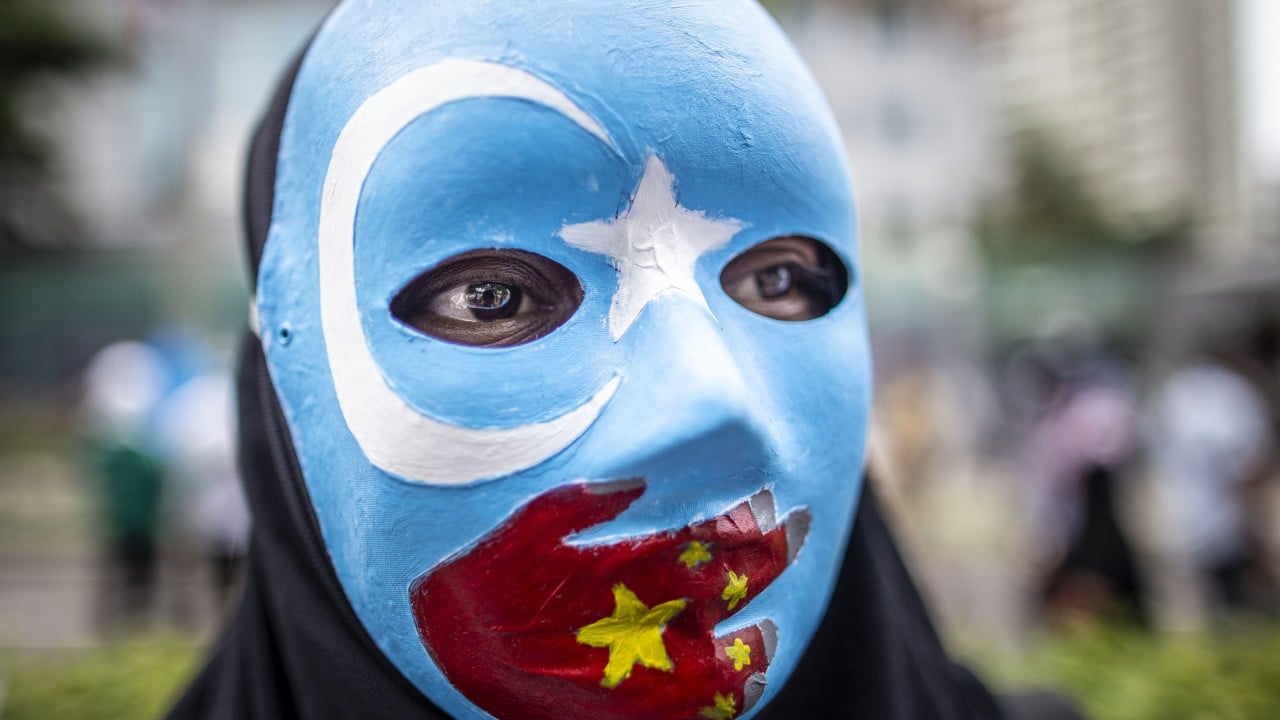
Exclusive | Xinjiang: US moves swiftly to enforce ban on cotton products linked to forced labour
- A day after its announcement, US customs has already detained shipments connected to a ban on Xinjiang Production & Construction Corps’ cotton
- US customs is also requesting American importers provide documentary evidence that they have full visibility of every stage of their cotton supply chain
US customs authorities are baring their teeth over a sweeping new ban on cotton products from Xinjiang, even as businesses scramble to remove the sprawling Xinjiang Production and Construction Corps (XPCC) from their supply chains.
“I’ve already seen a detention of goods and request for supply chain information in connection with this withhold release order (WRO),” said Elise Shibles, a former US Customs and Border Protection (CBP) officer, now an adviser at trade consultancy Sandler, Travis & Rosenberg.
This week’s WRO blocked the import of all XPCC-made cotton products, linking the quasi-military entity to the alleged widespread use of forced labour in Xinjiang. The ban will also apply to products made anywhere in the world containing raw cotton harvested by XPCC, which is responsible for about a third of China’s cotton production and which accounts for 17 per cent of the Xinjiang economy.
Experts say it is impossible to do business with China’s cotton and textile industries without also engaging with XPCC in some way.
If fully enforced, it could effectively amount to a ban on many garments from China and around the region. XPCC’s predominance in the opaque Xinjiang supply chain means it can be difficult to prove they have not been involved in some stage of production.
But an aggressive approach has seen the CBP backdate the ban to the end of November, according to a filing on its website – unusual for WROs, which are usually enforced from the day of issue. This is in line with the expiration of a general license for US firms trading with the XPCC, sanctioned under the Magnitsky Act.
The bulky questionnaire, seen by the South China Morning Post and confirmed by multiple sources, grilled companies on 36 in-depth questions on their connections to forced labour in Xinjiang, demanding they map their supply chain “from cultivation/extraction of raw materials to export shipment”.
Firms must provide documentary evidence that workers at “facilities throughout the supply chain” are legitimately employed.
“We can reasonably assume that this is one of the tools CBP is using to enforce the order. This type of questionnaire could lead CBP to identify companies who have robust traceability back to cotton fibre, and who might therefore be considered low risk. It also could lead CBP to identify companies who don’t have good visibility and who might therefore be considered higher risk,” said Shibles.
Firms must explain how they assess their cotton supply chains “to identify those imports that are more likely to be produced/harvested/extracted with forced labour”.

01:45
Indonesian and Malaysian Muslims protest in support of Uygurs in China
They must supply the paperwork, including supplier recruitment policies, factory audit reports, purchase orders, inland and export freight forwarding notes and bills of lading, to prove that they are fully aware of hiring and employment conditions throughout their entire supply chain.
A CBP spokesman told the Post that the questionnaire was part of “routine” risk assessment of importers to “ensure that the goods they import into the United States are compliant with federal laws and regulations, including those pertaining to forced labour”.
“As part of that outreach, CBP may solicit supply chain information to identify risks, target violative shipments, and ensure effective enforcement of US trade laws and regulations,” the spokesman added.
But trade lawyers said that it was unusual in its detail and scope, adding that it will be tough both to comply with, given the opacity of the industry, and to process, given the volume of documents requested.
This should put new fear in brands and retailers not only sourcing in China, but in any location using Chinese fabric
“I don’t know how they are going to administer and work through the responses,” said William Marshall, a trade lawyer at Hong Kong law firm Tiang & Partners. “Sophisticated garment companies are going to respond with old telephone book-sized submissions, overwhelming customs with an ocean of documents.”
The WRO is the latest in a succession of hardline US laws on Xinjiang, but is by far the broadest, industry analysts said.
“Up to now the orders have had limited impact, this one has a much broader scope,” said Eddie Jernigan, CEO at cotton supply chain advisory JG Global, adding that it also covers goods made outside China. “This should put new fear in brands and retailers not only sourcing in China, but in any location using Chinese fabric.”
Textiles companies in Hong Kong were digesting the scope of the ban, but have spent the past few months vetting their supply chains for traces of cotton linked to forced labour.
The owner of one large company, speaking anonymously due to the sensitivity of the issue, said they had hired an international audit firm to check the traceability of their yarn, while the company is sending up to 3 per cent of each of their yarn shipments to a laboratory for traceability analysis.
“We hope for the best – we are doing everything we can. We are keeping our paperwork very strong,” they said, adding that suppliers sourcing Xinjiang cotton will face financial penalties, or be dropped altogether.
Another senior executive at a multinational textiles firm said that the WRO had not been a surprise, but they will not panic until they see how it is enforced. “Will it be innocent until proven guilty or guilty until proven innocent?” they said.
Identifying whether XPCC may be involved in a US company’s supply chain is not always straightforward
Felix Chung, a member of the Legislative Council of Hong Kong for the Textiles and Garment constituency, said Hong Kong firms have been actively pivoting away from Chinese suppliers, knowing that 80 per cent of China’s cotton comes from Xinjiang.
“We can change where we buy the raw cotton from China to India or Pakistan,” said Chung, who acknowledged that the situation was “not good”.
International firms are wrestling with the complexity of the situation too, with XPCC having 862,600 direct and indirect holdings across 147 countries, according to an analysis of Chinese public records by data firm Sayari.
“XPCC’s subsidiaries and affiliates are rumoured to number in the thousands, and there is no readily accessible database or compilation of these entities. Thus, identifying whether XPCC may be involved in a US company’s supply chain is not always straightforward,” said Richard Mojica, a trade lawyer at the law firm Miller & Chevalier and a former CBP official.

